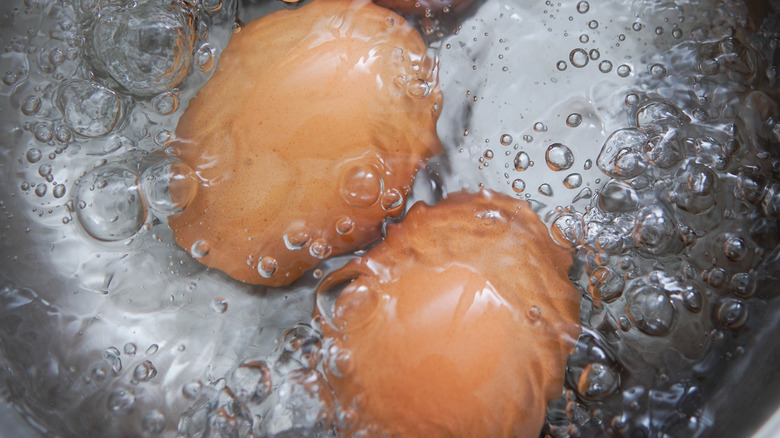The Key To Cooking Eggs At High Altitude Is Time (And Then More Time)
Inclusivity might seem like a social or political issue, but it can even affect the way we write recipes. Are the ingredients meant for people with unlimited funds and access to specialized grocery stores, or can they be obtained by those on a budget? Is the amount intended to feed a large crowd, or can it be tailored to someone dining solo? Well, to that list, add one more point to ponder: Where does the potential recipe user live, at sea level or 10,000 feet above? While the default setting seems to be low altitude, there are actually nine U.S. states where the average elevation is above 3,000 feet, which the USDA says is considered high altitude for food preparation purposes.
While many people are aware that high altitudes do affect how long you have to keep your cake in the oven, baking isn't the only thing affected by elevation. Water also takes longer to boil so that means, too, that your soft, hard, and in-between boiled eggs will also need more time. As a general rule of thumb, you should first consult one of those handy-dandy charts that tell you how long to cook an egg to make it hard-boiled. If the chart says 10 minutes, you'll need to add a minute for every 1,000 feet you're above 3,000. That means if you're in Flagstaff, Arizona at 6,909 feet, that egg will need a full 14 minutes to compensate for that super-high city's extra elevation.
Other egg-cooking methods are also affected by altitude
What if you're in the Mile High City and want to make a Denver omelet? That involves scrambling eggs instead of frying them, so no boiling water = no altitude issues, right? Think again. Denver's 5,280-foot elevation means not only that balls go flying out of Coors Field like nobody's business but that everything — eggs included — cooks just a little differently.
Even if you're cooking your eggs with a "dry" method, meaning one that's water-free, you'll still be affected by the fact that the eggs themselves contain water. In fact, an entire egg is 74% water, while whites are 88% water. This means you'll need to cook them longer at high altitudes than you would at a lower elevation. When you're going slow, though, be sure to keep the temperature low since cranking up the heat will just get you dried out or even burnt eggs.
Should you struggle with cooking high-altitude eggs, you might take comfort in the fact that even Gordon Ramsay experienced difficulty when he scrambled eggs on top of a mountain in Peru for his National Geographic series "Gordon Ramsay: Uncharted." The altitude was high enough that it had him literally gasping for breath, while the rendered alpaca fat he used might not be available in Denver or anywhere else in the northern hemisphere. Butter would probably do in a pinch, though, and the floral garnish Ramsay used for the finished eggs made a nice touch.

